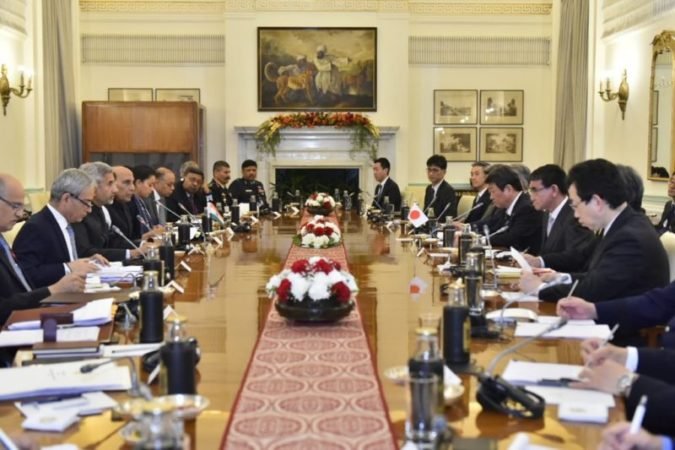India-Japan 2+2 Dialogue: An open and inclusive Indo-Pacific for all

For the first time, India and Japan hosted a ministerial-level 2+2 dialogue on peace in Indo-Pacific. Indian External Affairs Minister, Dr S. Jaishankar and Defence Minister Rajnath Singh met Foreign Affairs Minister of Japan, MOTEGI Toshimitsu, and Minister of Defense of Japan, KONO Taro, on 30 November 2019 in New Delhi.
Ministers from both the countries discussed a wide range of issues, ranging from the bilateral to multilateral and issues related to regional and international affairs.
Peace in Indo-Pacific remained the foremost of all the agendas on the table, the two sides expressed a common vision of a free, open, inclusive and rules-based Indo-Pacific region in which the principles of sovereignty and territorial integrity are ensured, and all countries enjoy the freedom of navigation and overflight.
Ministers from both the sides mentioned the threat posed to regional security by terrorist networks operating out of Pakistan and called upon it to take resolute and irreversible action against them and fully comply with international commitments including to FATF.
Bilateral Cooperation

Since last year India and Japan have initiated bilateral exercises between all three components (Army, Air Force and Navy) of their defence forces. Both sides agreed for holding the bilateral exercises between the defence forces regularly and further expanding the same. In this regard, the Ministers welcomed the recently conducted second “Dharma Guardian-2019” and the second edition of “SHINYUU Maitri-2019”.
Both the countries welcomed the significant progress made in the negotiations of Acquisition and Cross-Servicing Agreement (ACSA) and setting up of Information Fusion Centre – Indian Ocean Region (IFC-IOR).
It also emphasized the need to further strengthen the defence equipment and technology cooperation and looked forward to productive discussions in the fifth Joint Working Group on Defence Equipment and Technology Cooperation (JWG-DETC). and welcomed the progress made on cooperative research in the area of Unmanned Ground Vehicle (UGV)/ Robotics.
Multilateral Cooperation
Over recent years, the United States has emerged a significant ally for India an Japan in the Indo-Pacific region, in fact, it was Pentagon who renamed the Asia-Pacific region to the Indo-Pacific one, signalling a greater role for India in the region. Both the countries Recalled the Japan-India-US Summit Meetings in November 2018 and June 2019, and the trilateral cooperation with the US.

Both sides expressed their satisfaction at trilateral cooperation represented by the “MALABAR 2019” held from September-October 2019 off the coast of Japan, mine-countermeasures exercise (MINEX) held in Japan in July 2019 and “Cope India 2018” in which Japan participated as an observer in December 2018.
The recent, Quad Dialogue on the sidelines of UNGA in New York, between the Foreign Ministers of Japan-India-Australia-US in September 2019 also emerged as one of the multilateral agendas in the dialogue. Significant importance of further dialogues between Quad members also discussed.
Regional and International Affairs
ASEAN & South East Asia
ASEAN has emerged as a common meeting ground for both India and Japan, and a major pillar for India in its ‘Act East Policy’. Understanding the role of ASEAN, both the countries reaffirmed the importance of supporting ASEAN centrality and unity for promoting peace and prosperity of the Indo-Pacific

The Ministers welcomed the adoption of “ASEAN Outlook on the Indo-Pacific (AOIP)” during the 34th ASEAN Summit in Thailand in June 2019. The mutual understanding came out good on ASEAN for achieving their shared objectives. Both the countries also reiterated their support for ASEAN-led frameworks such as the East Asia Summit (EAS), the ASEAN Regional Forum (ARF) and ASEAN Defence Ministers’ Meeting-Plus (ADMM-Plus).
The Japanese side appreciated India’s announcement of “Indo-Pacific Oceans Initiative” at the recent 14th East Asia Summit (EAS) to create a safe, secure, stable, prosperous and sustainable maritime domain and confirmed their willingness to discuss concrete cooperation based on the Initiative.
India and Japan’s understands the need for a free and open Indo-Pacific, including also the recent “Indo-Pacific Oceans Initiative” and AOIP. An Indo-Pacific region that is inclusive and open to all countries in the region is what matches with the QUAD’s agenda which is dubbed by the critics as the gathering against China. However, Indian External Affairs Minister stated earlier that, he finds the idea of being someone else’s pawn in some ‘Great Game’ terribly condescending. EAM said, “I certainly don’t plan to play the counterweight to other people. I’m in it because of my own ambitions.”
The Indian side also welcomed Japan’s “Vientiane Vision 2.0” in November 2019 as an updated initiative for defence cooperation between Japan and ASEAN.
North Korea
North Korea also made its position as threat for the Indo-Pacific region, both the sides reaffirmed the importance of realizing North Korea’s complete, verifiable and irreversible dismantlement of all weapons of mass destruction and ballistic missiles of all ranges in accordance with the relevant United Nations Security Council resolutions (UNSCRs) and expressed their commitment to the full implementation of the relevant UNSCRs.
Both India and Japan have condemned North Korea’s recent launches of ballistic missiles which are a clear violation of the relevant UNSCRs. The press release suggests that both countries strongly urged North Korea to resolve the abductions issue at the earliest date.
South China Sea
Both the sides also exchanged views on the recent developments in the South China Sea and highlighted the importance of freedom of navigation and overflight, unimpeded lawful commerce and peaceful resolution of disputes with full respect for legal and diplomatic processes in accordance with the universally recognized principles of international law, including those reflected in the United Nations Convention on the Law of the Sea (UNCLOS)

Both the sides also took note of the negotiations of a Code of Conduct (COC) to ensure freedom of navigation and must not prejudice the rights and interests of the stakeholders using the South China Sea and freedoms of all states under international law.


















